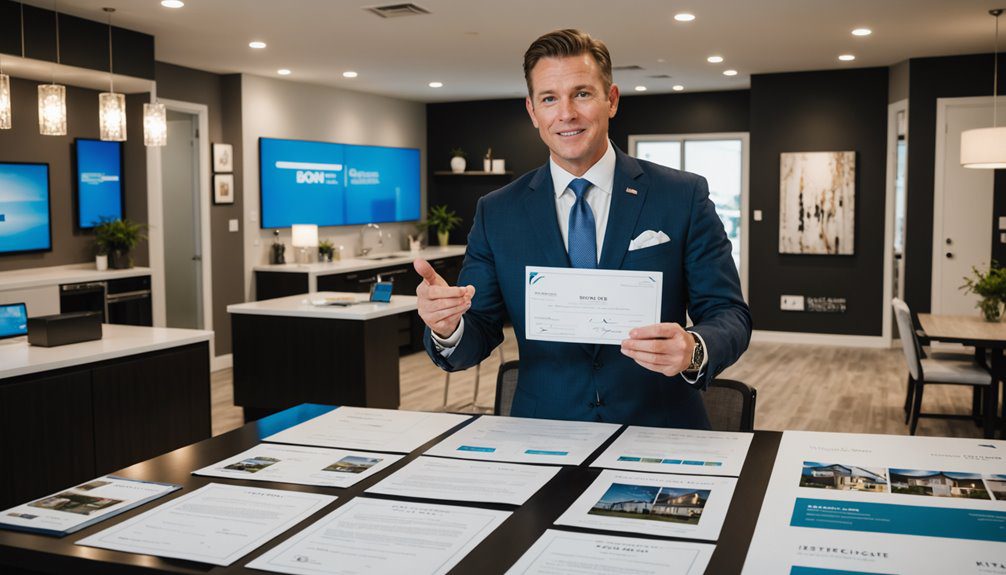If you're considering a career as a manufactured home salesperson in South Carolina, understanding the $15,000 bond is essential. This bond not only serves as a financial safety net for clients but also establishes a standard of professionalism within the industry. You'll want to know how it impacts your responsibilities and what it means for consumer trust. But before you jump into the application process or the costs involved, let's explore why this bond is a fundamental aspect of your role and how it can influence your success in the field.
Understanding the ,000 Bond

When it comes to working as a manufactured home salesperson, understanding the $15,000 bond is crucial. This bond acts as a financial safety net for your clients and the state, ensuring that you fulfill your obligations in your role.
Essentially, it's a promise that you'll adhere to the laws governing manufactured home sales, protecting consumers from unethical practices. You'll need to secure this bond before you can legally operate as a salesperson.
The process involves applying with a surety company, which will assess your background and financial stability. They'll determine your eligibility based on factors like your credit history and experience in the industry.
Once you obtain the bond, it's vital to keep it active. If a client files a claim against you due to a violation or misconduct, the bond provides financial compensation up to the $15,000 limit.
You may need to reimburse the surety company if claims are paid out.
Purpose of the Bond
The purpose of the manufactured home salesperson bond is to protect both consumers and the state from potential misconduct. When you engage in the sale of manufactured homes, this bond serves as a financial safety net. It ensures that you're held accountable for your actions and behavior in your professional dealings.
If you fail to comply with state laws or engage in fraudulent practices, the bond provides a source of compensation for consumers who suffer losses due to your misconduct.
By requiring you to obtain this bond, the state reduces the risk of unethical practices in the manufactured home industry. It establishes a level of trust between you and your clients, reassuring them that they've recourse should any issues arise.
This bond not only reflects your commitment to ethical conduct but also contributes to the overall integrity of the industry. Additionally, it ensures compliance with state bonding regulations, which further protects consumers and promotes accountability within the marketplace.
In short, the manufactured home salesperson bond is a crucial tool that safeguards consumers while promoting responsible business practices. It emphasizes that you're serious about your role and the responsibilities that come with it, ultimately fostering a more reliable and transparent marketplace.
Eligibility Requirements

To qualify for a manufactured home salesperson bond, you need to meet specific eligibility requirements set by your state. First, you must be at least 18 years old and a legal resident of the state where you plan to work. This ensures that you're able to fulfill the legal obligations associated with the bond.
You also need to hold a valid manufactured home salesperson license. Before applying for the bond, check that you've completed any required training or education courses that your state mandates.
Some states may require you to have a certain amount of experience in sales or real estate, so be prepared to provide proof if necessary.
Additionally, you should have a clean criminal record, especially concerning fraud or other financial crimes. This is crucial, as any past offenses can disqualify you from obtaining the bond. Furthermore, maintaining a clean criminal record can enhance your credibility and make it easier to secure favorable bond terms.
Bond Application Process
Navigating the bond application process involves several key steps that ensure you're prepared and compliant.
First, gather all necessary documents, such as your identification, proof of residence, and any relevant business licenses. These documents validate your identity and support your application.
Next, you'll want to choose a surety company to work with. Research different surety providers to find one that meets your needs and has a solid reputation.
Once you've selected a company, fill out their application form. This typically includes personal information, your business details, and any past experience related to manufactured home sales.
After submitting your application, the surety company will assess your qualifications. They may request additional information or conduct a credit check to determine your risk level.
Be prepared to answer questions or provide further documentation if needed.
Once approved, you'll receive a quote for your bond. Review the terms carefully before signing any agreements. Additionally, ensure you understand the cancellation provisions that may apply to your bond.
After securing your bond, ensure you keep a copy for your records, as you'll need to present it to the appropriate licensing authority to complete your registration as a manufactured home salesperson.
Costs Associated With the Bond

Once you've secured your bond, understanding the costs associated with it is important for budgeting and financial planning. The primary cost is the premium you'll pay, which typically ranges from 1% to 5% of the bond amount. For a $15,000 bond, this means you might pay between $150 and $750 annually. Factors affecting your premium include your credit score, experience in the industry, and claims history.
In addition to the premium, there may be other fees involved. Some surety companies charge a one-time application fee, while others might have renewal fees when it's time to extend your bond. Always read the fine print to understand any additional costs that may arise.
It's also wise to consider the financial stability of the surety company you choose. A company with a solid reputation might charge a slightly higher premium, but you'll benefit from better service and reliability in the long run. Understanding bond requirements is crucial for maintaining market credibility.
As you assess these costs, keep in mind the potential risks of operating without a bond, which can lead to greater financial setbacks. Planning for these expenses will help ensure you're prepared for the road ahead.
Responsibilities of Salespersons
Salespersons in the manufactured home industry regularly take on significant responsibilities that directly impact their success and the satisfaction of their clients. You're not just selling homes; you're guiding clients through one of the most important decisions of their lives. This means you need to be knowledgeable about the different models, features, and financing options available, ensuring you can provide accurate information.
You must also build and maintain strong relationships with clients. Listening to their needs and addressing their concerns is crucial. By doing so, you can tailor your approach and help them find the right home.
Additionally, you're responsible for managing the sales process efficiently, including completing necessary paperwork and ensuring compliance with regulations.
Another key aspect of your role is being a reliable resource. Clients might turn to you for advice on home maintenance, financing, or community resources. Staying informed and accessible will enhance your credibility and foster trust.
Lastly, you should be proactive in marketing efforts, helping to attract potential buyers and expand your client base. By embracing these responsibilities, you not only enhance your career but also contribute to a positive experience for your clients.
Consumer Protection Benefits

Ensuring consumer protection benefits is essential in the manufactured home industry, as it directly influences buyer confidence and satisfaction. When you engage with a licensed salesperson backed by a $15,000 bond, you're not just making a purchase; you're entering a secure environment where your interests are prioritized.
This bond acts as a financial safety net, ensuring that if a salesperson acts unethically or fails to fulfill their obligations, you have recourse. With this bond in place, you can feel more at ease knowing there are protections against fraud or misrepresentation.
If things go wrong, the bond can cover your losses up to the specified amount, giving you a sense of security in your investment. Additionally, this requirement encourages salespersons to adhere to ethical practices, as their reputation and livelihood depend on maintaining the trust of their clients.
Ultimately, the bond fosters an atmosphere of accountability and professionalism in the manufactured home market. As a consumer, you benefit from this protective measure, allowing you to focus more on finding the right home rather than worrying about potential pitfalls in the buying process. Moreover, the bond ensures compliance with local and state regulations, promoting regulatory standards that protect consumers.
Tips for Successful Bonding
Successfully securing a manufactured home salesperson bond can often feel daunting, but it's a manageable process with the right approach.
First, ensure you understand the bonding requirements specific to your state. Each state has unique regulations, so familiarize yourself with what's needed.
Next, gather all necessary documentation. This typically includes proof of your identity, financial statements, and any required licenses. Having everything ready will speed up the application process and reduce potential delays.
It's also essential to shop around for a surety company. Compare quotes and terms from different providers. This not only helps you find the best rate but also gives you options if you encounter issues with one company.
Once you've selected a surety, complete the application thoroughly. Double-check for accuracy to avoid any unnecessary setbacks.
After submitting, be prepared to answer additional questions or provide more information if requested.
Lastly, maintain good credit and a strong financial profile. A positive financial history can lower your bond premium and increase your chances of approval. Additionally, understanding the importance of surety bonds in Arkansas can help you navigate the bonding process more effectively.
Conclusion
In conclusion, the South Carolina Manufactured Home Salesperson $15,000 Bond is essential for promoting ethical practices in the industry and protecting consumers like you. By understanding its purpose and requirements, you can feel confident when working with licensed salespersons. This bond not only helps ensure accountability but also empowers you in your home buying journey. Keep these insights in mind, and you'll be better equipped to navigate the manufactured home market with peace of mind.


